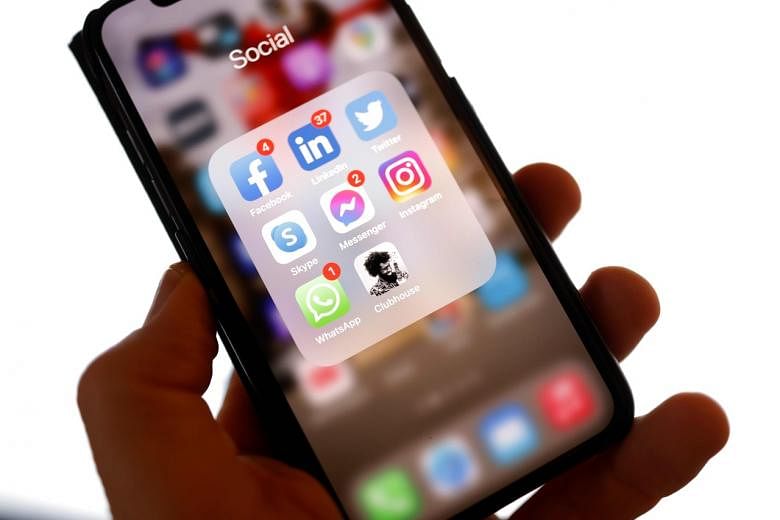HONG KONG (BLOOMBERG) - The US app Clubhouse erupted among Chinese social-media users over the weekend, with thousands joining discussions on contentious subjects such as Taiwan and Xinjiang undisturbed by Beijing's censors.
On the invite-only, audio-based social app where users host informal conversations, Chinese-speaking communities from around the world gathered to discuss China-Taiwan relations and the prospects of unification, and to share their knowledge and experience of Beijing's crackdown on Muslim Uighurs in the far west region of Xinjiang.
Open discussion of such topics is off limits in China, where heavy government censorship is the norm. Unfavourable comments or articles are rapidly removed on platforms such as Tencent Holdings Ltd.'s WeChat and Sina Corp.'s microblogging platform Weibo.
As of Sunday (Feb 7), Clubhouse was accessible in mainland China without needing a VPN, which is commonly used to bypass the so-called Great Firewall and access foreign internet services from Gmail to Twitter.
Clubhouse, backed by California-based venture firm Andreessen Horowitz, has skyrocketed in popularity following its debut in March 2020 after attracting high-profile users such as Elon Musk and Oprah Winfrey.
Since Clubhouse so far is only accessible on Apple Inc.'s iPhone and users must have a non-Chinese Apple account, the app has only gained traction among a small cohort of educated citizens, according to Fang Kecheng, a communications professor at the Chinese University of Hong Kong.
"I don't think it can really reach the general public in China," he said. "If so, it will surely get blocked."
Clubhouse did not respond immediately outside of business hours to an e-mailed request for comment on Chinese user requirements, content related to the country and if the government had reached out to it.
'I can tell my story'
On Friday night, a room attracted more than 4,000 people from both sides of the Taiwan Strait to share their stories and views on a range of topics including uniting the two sides.
In another room on Saturday, several members of the Uighur ethnic community now living overseas shared their experience of events in Xinjiang, where China has rolled out a widely criticized re-education program that saw an estimated 1 million people or more put into camps.
US Secretary of State Antony Blinken agreed with the Trump administration's move to call China's actions "genocide". China has defended the policies, saying they are necessary to fight terrorism.
Some Clubhouse participants in the Xinjiang chat said they had lost contact with their family members and hadn't returned home for at least four years.
"Thanks to Clubhouse I have the freedom and the audience to express my opinion," a Finland-based doctor and activist who goes by Halmurat Harri Uyghur told Bloomberg News. "The app is beneficial to me, providing a platform for dialog between Uighurs and Chinese where I can tell my story."
While most discussions were polite - in line with Clubhouse's aim to provide an alternative to the toxicity of other social media platforms - some couldn't hide their distrust and dismissed the views shared by some of the Xinjiang participants.
There were also "silent rooms" including one to mourn the one-year anniversary of the death of Li Wenliang, the Wuhan doctor who was reprimanded by police when he tried to warn peers that a new pathogen was circulating, and who later died from Covid-19.
Another room popular with Chinese speakers discussed sexuality, while others kept the discussion to relatively "safe" topics such as books and music.
The voice of "official China" wasn't completely absent from Clubhouse: One room was dedicated to rebroadcasting Xinwen Lianbo, the country's prime-time news program aired by the state-backed channel CCTV.
Michael Norris, research and strategy manager at Shanghai-based consultancy AgencyChina, said most Chinese Clubhouse users he'd spoken to are part of tech, investment and marketing circles - people keen to hear from overseas peers and industry titans such as Musk and Mark Zuckerberg.
"Those who do engage in political discussion on Clubhouse take on a degree of personal risk," he said. "While most are aware Clubhouse records real names, phone numbers and voice, they are broadly unaware about recent cases in China involving interrogation and jail for errant posts on Twitter."
Discover podcasts by The Straits Times & The Business Times: https://str.sg/JWVR
Niche series below:
Follow BT Money Hacks Podcast on: http://bt.sg/btmoneyhacks
Follow BT Mark To Market Podcast on: http://bt.sg/btmark2mkt
Follow Health Check Podcast on: https://str.sg/JWaN
Follow Green Pulse Podcast on: https://str.sg/JWaf
Follow Asian Insider Podcast on: https://str.sg/JWa7
Follow Lunch With Sumiko Podcast on: https://str.sg/J6hQ
Follow #PopVultures Podcast on: https://str.sg/JWad
Follow Life Weekend Picks Podcast on: https://str.sg/JWa2
Follow #GameOfTwoHalves Podcast on: https://str.sg/JWRE
Follow Bookmark This! Podcast on: https://str.sg/JWas
Follow our shows then, if you like short, practical podcasts!

